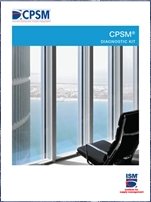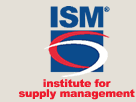Home > Publications > eSide Supply Management

CPSM® Update
3 Questions, 3 Answers
November/December 2010, eSide Supply Management Vol. 3, No. 6
eSide offers sample questions (and answers) from the CPSM® Diagnostic Kit.
In every edition, eSide offers three sample questions — and answers — from the CPSM® Diagnostic Kit to help you prepare to pursue your CPSM® certification. First, answer all three questions; then, scroll down to the "3 Answers" section to find out how you fared.
3 Questions
Question 1: A supply manager for a privately held manufacturing company is preparing an RFP for raw materials. None of the RFP recipients is an incumbent and the award resulting from the RFP is expected to be of significant dollar value. The supply manager is concerned that the lack of publicly available financial information could impact willingness of the prospective suppliers to submit proposals. Which of the following will BEST address the concerns of the prospective bidders?
- Escrow letter
- Letter of credit
- Payment bond
- Surety bond
Question 2: Country A has a large and steadily increasing trade surplus with Country B. It is MOST likely to also have
- barriers on Country B's imports
- shelters on Country B's imports
- preferences for Country B's imports
- balances on Country B's imports.
Question 3: A supply manager's organization has grown dramatically due to a recent merger. The supply manager hopes to work throughout the organization to achieve greater synergy, and thereby benefit not only the local operation, but those of other branches as well. Which of the following actions is MOST consistent with this goal?
- Explaining the benefits of world-class supply management for the expanded organization at the executive council meeting
- Surveying other locations to identify parts used by multiple areas, in order to pool demand
- Ensuring that supply managers are responsive to internal customers' needs, in order to minimize "backdoor buying"
- Proposing changes to inventory management that will have positive effects on service levels
3 Answers
Question 1: Option B is correct because a letter of credit assures a supplier that payment will be made by the issuing bank after terms of the agreement are met. An escrow account (Option A) might also provide some assurance, but can be with any third-party and so may not offer the same degree of financial confidence. A payment bond (Option C) protects the buying organization against claims or liens filed by second-tier suppliers or subcontractors if the prime supplier doesn't pay them. A surety bond (Option D) makes one party (the surety) responsible for the debt of another.

References: CPSM® Study Guide, 1st Edition (Book 1 — Foundation of Supply Management), page 12; ISM Professional Series (Book 1 — Foundation of Supply Management), page 98.
Question 2: Option A is correct. One reason why Country A has a growing trade surplus (meaning more products exported to Country B's products imported into Country A) may be that Country A has created barriers to the import of Country B's goods. Options B, C and D are not correct because shelters, preferences and balances do not create trade surpluses. In fact, they work to balance trade in both directions.
References: CPSM® Study Guide, 1st Edition (Book 2 — Effective Supply Management), pages 1-2, 5; The Supply Management Handbook (7th Edition), page 173.
Question 3: Option B is correct because it addresses the particular and immediate advantages of aggregating demand. The other options are applicable to all phases of supply chain management, not just to improvements based on pooling volume from various locations. Option A would not be helpful because the executive council probably already understands the benefits of world-class operations and has other more immediate issues to deal with from the merger. Responsiveness to internal customers' needs (Option C) is a local issue and less likely to be affected by the merger. Changes to inventory management (Option D) may be helpful, but the benefits are less direct and less immediate than pooling demand.
References: CPSM® Study Guide, 1st Edition (Book 3 — Leadership in Supply Management), page 8; ISM Professional Series (Book 3 — Leadership in Supply Management), pages 147-148; The Supply Management Handbook (7th Edition), page 69.
For more information on ISM's professional credentials, visit the Institute's website.
Take me to the eSide home page.
-
About ISM
- Overview of ISM
- Media Room
- ISM Board of Directors
- ISM Officers Directory
- Affiliate Officers Directory
- ISM Affiliate Web Sites
- ISM Group and Forum Web Sites
- Frequently Asked Questions
- Chair's Corner
- ISM Annual Reports
- J. Shipman Gold Medal Award
- ISM Awards for Excellence
- Supply Management Month
- Association Governance
- ISM Ethical Principles and Standards
- Activity Calendar
- Principles of Social Responsibility
- ISM Position Statements
- Membership
-
Members Only
- InfoCenter
-
Member Information & Online Tools
- ISM Glossary of Key Supply Management Terms
- Access to CIPS Members Only Content
- Access to Supply Chain Council (SCC) Member Discounts and Resources
- ISM Tool Kit
- ISM Resource Guides
- ContractWare®Net and eTool Agreements
- Address Update Form
- Activity Calendar
- Affiliate Websites
- Group & Forum Websites
- ISM Principles and Standards of Ethical Supply Management Conduct
- ISM Group/Forum Enrollment Information
- Job Descriptions
- The Business Source
- Propurchaser.com
- eVendor Check
- Personal Professional Development Scorecard
- Affiliate Resources
- Career Center
-
Affiliate, Groups & Forums
- Affiliate, Group/Forum Award Information
- Group/Forum Enrollment Information
- Group/Forum Enrollment Form
- Groups & Forums Brochure and Flyer
- Group & Forum Case Studies
- Groups & Forums Promotion
- Spotlight on Groups and Forums
- Group and Forum Officers
- Affiliate Web Sites
- Group & Forum Web Sites
- Affiliate Officers
- ISM Officers
- Sign up for ISM's Groups and Forums Discussion List Servs
- Search for Speakers
- Discussion Forums
-
Additional Resources
- ISM Resource Guides
- Bid Specifications Database
- Purchasing/Supply Management Periodicals
- Other Web Resources
- Practix - A quarterly Best Practices publication
- ISM's Principles and Standards of Ethical Supply Management Conduct
- Associations/Organizations Useful to Purchasing/Supply Management Professionals
- CIPS Study
- Search Articles
- CIPS Members Only Content
-
Ethics and Social Responsibility
- ISM Ethical Principles and Standards
- Principles of Sustainability and Social Responsibility
- Business Case
- Supporting Organizations
- Fostering Sustainability and Social Responsibility Form
- Research
- Articles
- General Resources
- Training
- Assessments
- Metrics and Indices
- International
- ISM's Committee on Sustainability and Social Responsibility
- Job Descriptions
-
Education - Seminars, Conferences
- Conferences
- Seminars
- Knowledge Center — Online Courses
-
ISM-ADR School for Supply Management
- Customized and Standard Training and Development
- Professional Development Seminars (In-house, Instructor-Led)
- Knowledge Center Courses (Web-based, Online)
- DNA (Development Needs Analysis)
- ISM-ADR School for Supply Management Brochure
- Summary of all Program Formats
- Your Dedicated Program Managers
- Request for Professional Development Information
- Speaking Opportunities
- Speakers Directory
-
Academic/Student Opportunities
- ISM Education Resource Committee ERC
- ISM Academic Research Support Programs (Grants)
- North American Research Symposium (NARS)
- R. Gene Richter Scholarship Program for Undergraduate Students
- Scholarships Offered by Affiliates, Groups, and Forums
- Colleges and Universities Offering Purchasing/Supply Management Courses
- ISM Approved Programs
- Glossary of Key Supply Mgmt Terms
- ISM Resource Guides
- ISM Tool Kit
- Exhibiting/Sponsorship Opportunities
- Products
- Publications
-
Professional Credentials
- Frequently Asked Questions
- Certified Professional in Supply Management®
- Certified Professional in Supplier Diversity
- Certified Purchasing Manager (C.P.M.)
- Accredited Purchasing Practitioner (A.P.P.)
- Certification Forms
- Work Experience Information
- Credentials Discussion Forum
- Credentials Verification
- Additional Program Information
- International Certification Contacts
- Supply Line 2055: Certification Update
-
ISM Report On Business®
- Latest Manufacturing ROB
- Latest Non-Manufacturing ROB
- Reports On Business® Overview
- Report On Business® Brochure
- Semiannual Reports
- Seasonal Adjustments
- Manufacturing Data
- Non-Manufacturing Data
- ROB Graphical Data
- Regional Business Survey Data
- How to Respond to ROB
- ROB Online Infokit
- JPMorgan Global PMI Reports
- Other Economic Information
- ROB Release Dates
- ROB Frequently Asked Questions
- ISM/Forrester Research Report
-
Career Center
- Your Profile
- Register for the Career Center
- Job Seekers
- Employers' Corner
-
More Career Resources
- Job Descriptions
- Job Hunting Sites on the Web
- Job Hunting Sites for Specific Regional Areas
- Job Hunting Sites with Tools Such as Resume Writing Advice
- Careers In Supply Management
- Resources on Relocating
- Salary/Career-Building Resources
- Schools Offering Purchasing/Supply Management Courses
- Academic/Student Opportunities
- Frequently Asked Questions
- CAPS Research
-
Tools
- InfoCenter
- Research Tools
- Business Book List
- Discussion Forums
- Directories
- Affiliate Resources
- Group & Forum Information
- eTool Agreements
- ISM's Principles and Standards
- Supply Management Defined
- Other Association Links
- Other Related Information
- The Business Source
- Propurchaser.com
- eVendor Check
- Purchasing & Supply Sourcing Guide
- Access CIPS Members Only Content
- Access to Supply Chain Council (SCC) Member Discounts and Resources

In This Section: ![]()



